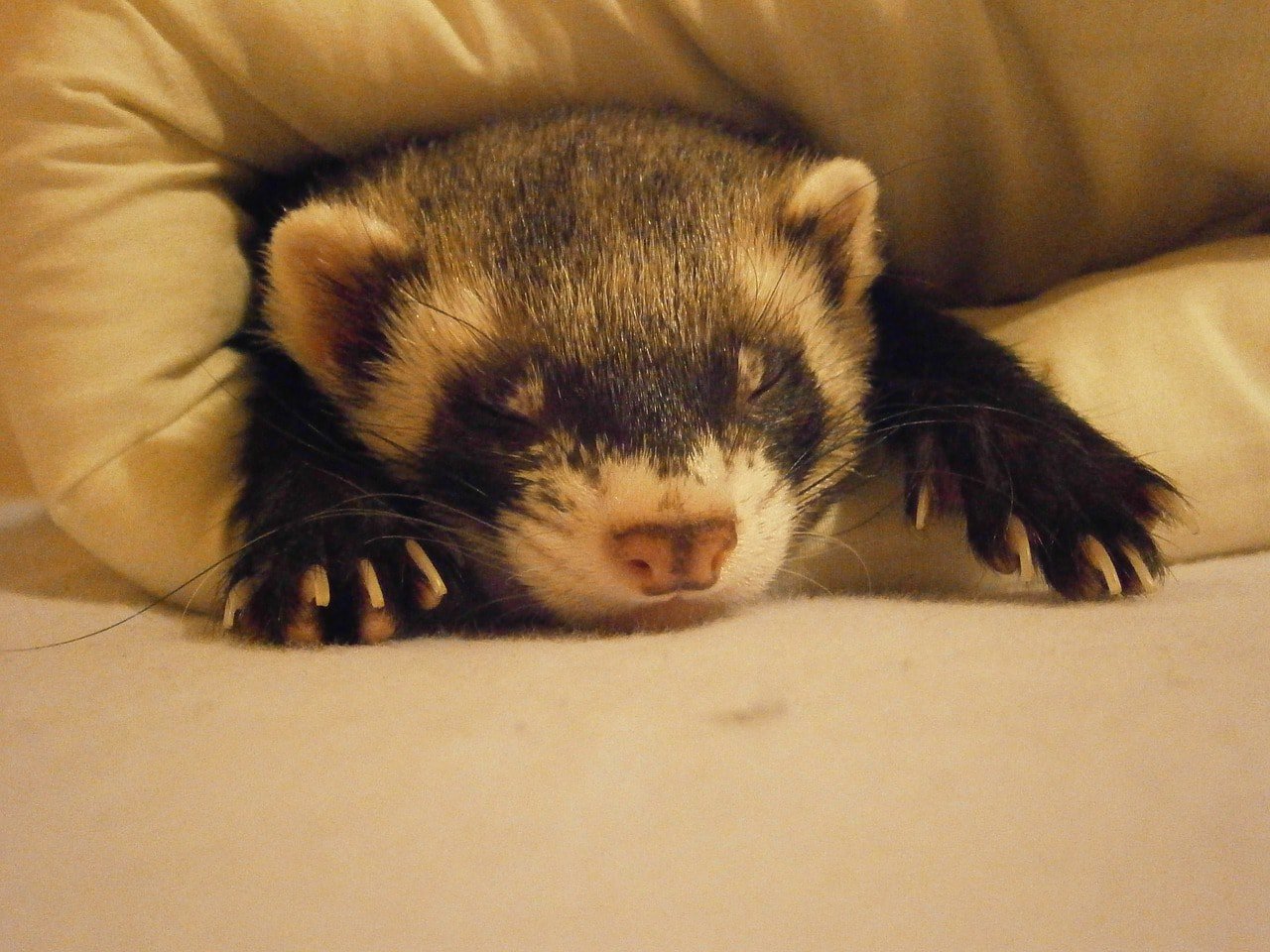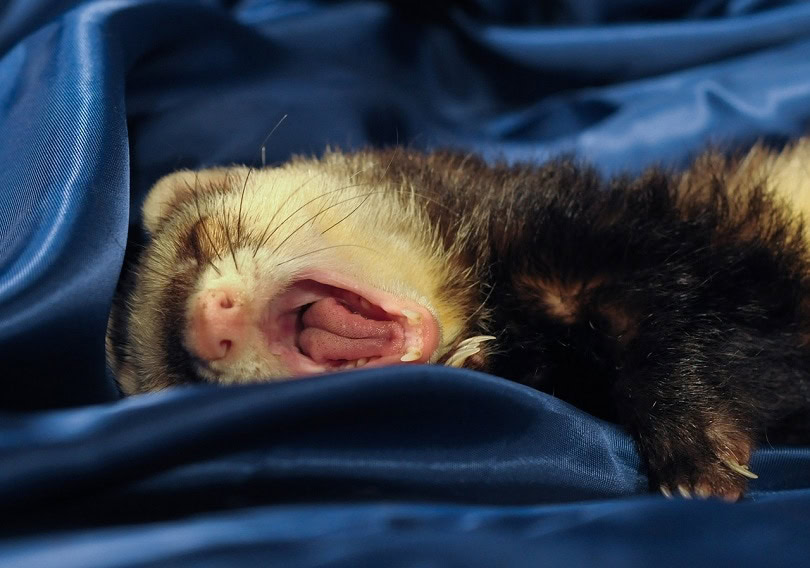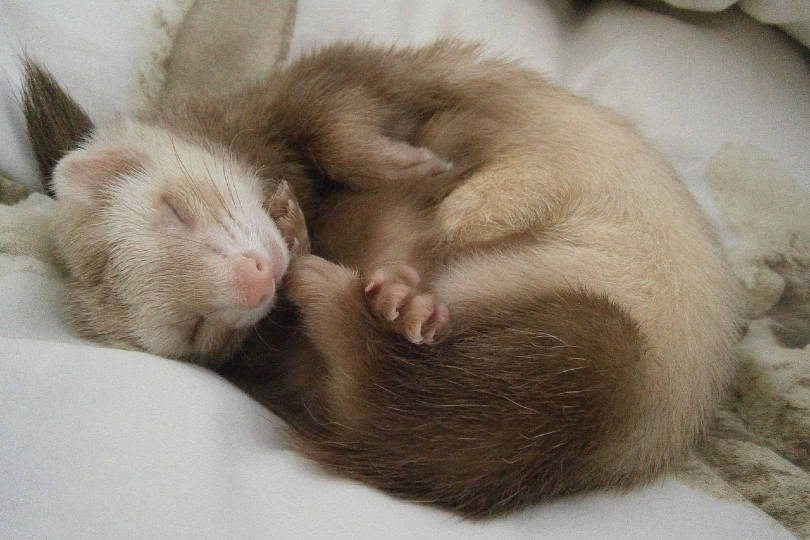VET APPROVED

The information is current and up-to-date in accordance with the latest veterinarian research.
Learn more »Click to Skip Ahead
Ferrets are known as big sleepers because they can sleep 16 to 20 hours a day. Their sleeping period extends during winter, but that doesn’t mean hibernation is their thing.
Ferrets do not hibernate, but they do spend more time resting in winter. We’ll explain it all below.

What Is Hibernation?
Hibernation is a state an animal can experience during cold winter months with the sole purpose of surviving the harsh winter conditions. In that state, the animal minimizes every aspect of their life, from metabolic rate to heart rate, even breathing.
It’s recognized as a state of minimal activity where animals sleep for an extensive period of time, from days up to a few months.
Which Animals Hibernate?
There are many animals that hibernate. For example, ground squirrels, European hedgehogs, bats, prairie dogs, bears, and box turtles. There is even evidence that wood frogs, snails, and even the queen bumblebee hibernate too. Ferrets aren’t on that list because they don’t hibernate.


What Is Ferret Dead Sleep?
A ferret’s “dead sleep” is the closest thing a ferret experiences to hibernation. This is a deep state of sleep when a ferret is unresponsive to outer stimuli. That means you can grab your ferret, hold them, pet them, and they won’t move a muscle. They will hang from your hands like a doll, which can trigger panic in ferret owners because your ferret may look like it is dead.
Not all ferrets experience the same degree of deep sleep. We can’t know if (and when) a ferret will experience dead sleep. What we do know is that it is natural and normal for them.
How to Check On a Ferret in Dead Sleep
If you want to make sure your ferret is asleep and not in a coma or dead, the first thing you need to do is stay calm. Check their breathing and take a look at their nose and gums. If your ferret is okay, you will see slow and shallow breaths, the nose should be pink (if a ferret has a pink nose), and gums should also be a healthy pink color.
How to Wake Up a Ferret From Dead Sleep
Now that you know your ferret is not dead or in a coma because you’ve checked that your ferret is breathing normally and shows no signs of distress, there’s usually no need to wake them. In fact, it’s best to let them rest unless you truly need to wake them for a specific reason, such as giving medication or attending a vet appointment.
However, if you do need to wake your ferret, remember to do it gently. No one enjoys being startled out of a deep sleep! Try softly calling their name, placing them in your lap, and gently stroking their head or tummy. If that doesn’t work, you can try holding a small treat near their nose; the smell may coax them awake after a few moments. Still, unless it’s necessary, it’s always kindest to let your ferret wake up on their own.
- Related Read: Do Ferrets Need Vaccination Shots? Which Ones?

Ferret Sleeping Schedule
Ferrets will spend most of their days sleeping, but they can easily adjust their sleeping schedule to you and your presence. It is beneficial to know that ferrets are actually crepuscular, meaning they are most active during dawn and dusk.

How Much Do Baby Ferrets Sleep?
The biggest sleepers are baby ferrets. They spend most of their awake time eating and going to the bathroom, which gives them 20 to 22 hours of sleep every day. But once a baby ferret becomes a young ferret (a kit), his energy level increases, and sleeping time becomes much shorter.
How Much Do Adult Ferrets Sleep?
Adult ferrets sleep 16 to 18 hours a day, similar to young ferrets (kits). But their main difference is the activity. Young ferrets tend to spend most of their time jumping, running, playing, and exploring. Adult ferrets, especially as they age, may still sleep just as much but tend to be less energetic. Rather than constant play, they might spend their awake time relaxing, grooming themselves, or calmly wandering around their environment.
Do Ferrets Sleep More in the Winter?
Ferrets have two important seasons in their life, the summer and winter, and they should happen every year. Two of the most obvious signs of seasons are fur changes and weight gain. Another not-so-obvious trait is the drop in energy level.
Most ferrets will become less active during the winter months, which results in a longer sleeping schedule. This is normal as long as everything else is the same in their behavior.
Can Sleeping Be a Sign of Illness?
Maintaining a good sleeping schedule is important to ferrets because it is also a sign of good health. If your ferret is sleeping more than usual, if he becomes lethargic, or even accompanies this low energy with vomit or loss of appetite, it can be a sign of some illness.
If your ferret is drooling, stiff, vomiting, or overall unresponsive, go to the vet as soon as you can.


Final Thoughts
Sleep is a very important part of every ferret’s life, young and old. Although ferrets don’t hibernate, they can enter a deep sleep from time to time. The first time you notice your ferret in a so-called “dead sleep” may be stressful, but remember that for them, this is normal behavior.
But, if you have any doubts about your ferret’s sleeping schedule, it is a smart move to visit the vet with your ferret.
Featured Image Credit: ursulacatenazzi0, Pixabay










